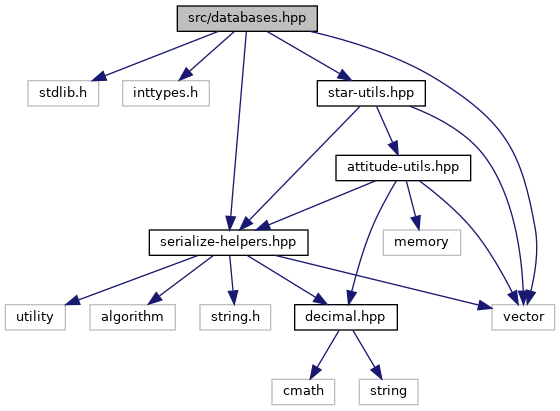Loading...
Searching...
No Matches
#include <stdlib.h>#include <inttypes.h>#include <vector>#include "star-utils.hpp"#include "serialize-helpers.hpp"
Include dependency graph for databases.hpp:

This graph shows which files directly or indirectly include this file:

Go to the source code of this file.
Classes | |
| class | lost::KVectorIndex |
| A data structure enabling constant-time range queries into fixed numerical data. More... | |
| class | lost::PairDistanceKVectorDatabase |
| A database storing distances between pairs of stars. More... | |
| class | lost::MultiDatabase |
| class | lost::MultiDatabaseEntry |
Namespaces | |
| namespace | lost |
| LOST starting point. | |
Macros | |
| #define | MULTI_DB_FLOAT_FLAG 0x0001 |
| A database that contains multiple databases This is almost always the database that is actually passed to star-id algorithms in the real world, since you'll want to store at least the catalog plus one specific database. | |
Typedefs | |
| typedef std::vector< MultiDatabaseEntry > | lost::MultiDatabaseDescriptor |
Functions | |
| bool | lost::isFlagSet (uint32_t dbFlags, uint32_t flag) |
| void | lost::SerializePairDistanceKVector (SerializeContext *ser, const Catalog &catalog, decimal minDistance, decimal maxDistance, long numBins) |
| Serialize a pair-distance KVector into buffer. | |
| void | lost::SerializeMultiDatabase (SerializeContext *ser, const MultiDatabaseDescriptor &dbs, uint32_t flags) |
Variables | |
| const int32_t | lost::kCatalogMagicValue = 0xF9A283BC |
Macro Definition Documentation
◆ MULTI_DB_FLOAT_FLAG
| #define MULTI_DB_FLOAT_FLAG 0x0001 |
A database that contains multiple databases This is almost always the database that is actually passed to star-id algorithms in the real world, since you'll want to store at least the catalog plus one specific database.
Multi-databases are essentially a map from "magic values" to database buffers.
Definition at line 102 of file databases.hpp.